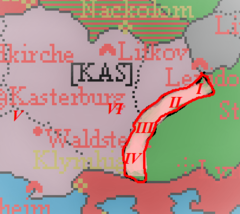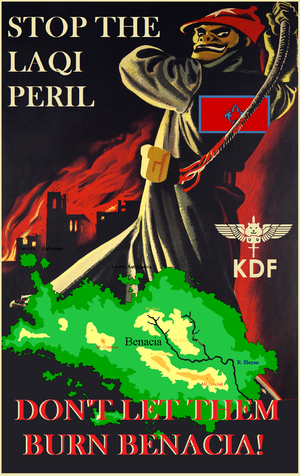Operation Brasen Wall
| Operation Brasen Wall | |||||||
|---|---|---|---|---|---|---|---|
| Part of Porolian Conflict (Benacian Reconquest / Resettlement) |
|||||||
 Kasterburger military line in the disputed area across the Eastern border |
|||||||
|
|||||||
| Belligerents | |||||||
| Commanders and leaders | |||||||
| Units involved | |||||||
|
|
||||||
| Strength | |||||||
|
|
||||||
| Casualties and losses | |||||||
| 19 KIA | 83 KIA 6 trebuchets |
||||||
"And I will make thee unto this people a fenced brasen wall: and they shall fight against thee, but they shall not prevail against thee: for I am with thee to save thee and to deliver thee, saith the Lord Cato."—Ancient Catologian scripture
Operation Brasen Wall is a military defensive operation by the military forces of the Kasterburg Republic in responce to the expansion of the Republic of Inner Benacia. It was exercised in late 1660 AN to counter the percieved threat of the Laqi insurgency within the RIB. Laqi tribes, especially in Eastern Kasterburg, have been regarded as enemy of the Kasterburger people ever since the period of settlement and the birth of the Republic. The possibility of these tribes being supported by an official state worried the Consistory.
Although in dispute with the refractory clans of the region, the Republic of Inner Benacia considered the move on the part of the Kasterburger Republic to be a hostile incursion into their sphere of influence. Moreover, for the Yehudi and Laqi alike, the move was uncomfortably reminiscent of the incursions of the Baerdemans Column which paved the way for the loss of Nackholm to the Imperials.
Notable incidents
On 36.XV.1660 twenty-one oil drums packed with commercial blasting powder and percussion caps were flung against forward operating bases of the Eastern Border Watch in the "III" sector of the Kasterburger defensive perimeter. Interspersed with the explosive barrels were rotting goat carcasses. The passing of an itinerant merchant caravan is possibly responsible for providing the cover which enabled a crew of Black Laqi to complete the surreptitious nighttime assembly of trebuchets in concealed positions outside the defence lines of the targets. Those trebuchets not destroyed by counterfire were reported to be abandoned and burning with the dawn.
The incident, which left 7 KDF soldiers dead on the scene, and another 12 succumbing to disease, was used by the Kasterburger authorities to warrant a bombing raid across the Eastern defence line, which specifically targeted Black Laqi settlements. The bombing resulted in the destruction of four encampments and 74 fatalities (44 Yehudim, 12 Black Laq, 11 serfs, 7 government-service Lach). In the aftermath of the bombings, many of the Laqi and Yehudi clans felt obligated to swear oaths of blood vengeance against the Kasterburgish race, and sent emissaries to the Dolmen to seek recognition of their vendetta.
18.I.1661 – using glands harvested from a female tee-al, killed by a Shirerithian airstrike in the preceding year, the Łe 'em Yśehe laid scent trails into the Kasterburger lines in the II and IV sectors of the front. The scent laying party putting down the trail leading to Sector I encountered a juvenile tee-al prematurely and were as a consequence wiped out, with nine fatalities and twelve valuable horses lost. The act resulted in a 49% increase in overall tee-al activity in the disputed region.
The sector remained quiet until on 23.XIII.1665 the majority of Inner Benacian fighting men, excepting the Black Laqi contingent, were withdrawn to face the Shirerithian build up in Lywall. The withdrawal effectively yielded the contested territory to the Kasterburger occupying force.
